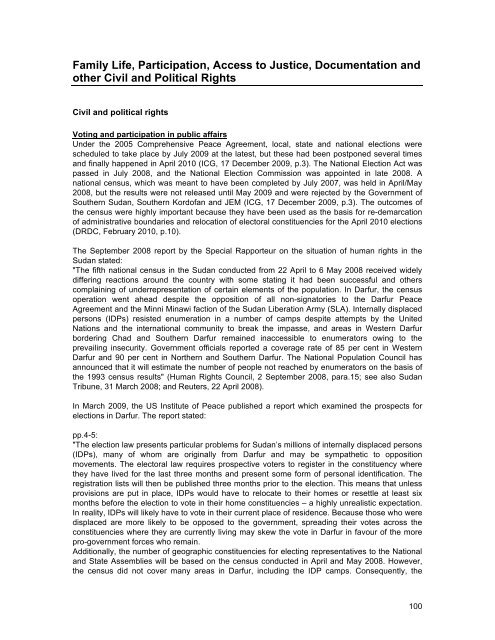SUDAN: Durable solutions elusive as southern IDPs return and ...
SUDAN: Durable solutions elusive as southern IDPs return and ...
SUDAN: Durable solutions elusive as southern IDPs return and ...
Create successful ePaper yourself
Turn your PDF publications into a flip-book with our unique Google optimized e-Paper software.
Family Life, Participation, Access to Justice, Documentation <strong>and</strong><br />
other Civil <strong>and</strong> Political Rights<br />
Civil <strong>and</strong> political rights<br />
Voting <strong>and</strong> participation in public affairs<br />
Under the 2005 Comprehensive Peace Agreement, local, state <strong>and</strong> national elections were<br />
scheduled to take place by July 2009 at the latest, but these had been postponed several times<br />
<strong>and</strong> finally happened in April 2010 (ICG, 17 December 2009, p.3). The National Election Act w<strong>as</strong><br />
p<strong>as</strong>sed in July 2008, <strong>and</strong> the National Election Commission w<strong>as</strong> appointed in late 2008. A<br />
national census, which w<strong>as</strong> meant to have been completed by July 2007, w<strong>as</strong> held in April/May<br />
2008, but the results were not rele<strong>as</strong>ed until May 2009 <strong>and</strong> were rejected by the Government of<br />
Southern Sudan, Southern Kordofan <strong>and</strong> JEM (ICG, 17 December 2009, p.3). The outcomes of<br />
the census were highly important because they have been used <strong>as</strong> the b<strong>as</strong>is for re-demarcation<br />
of administrative boundaries <strong>and</strong> relocation of electoral constituencies for the April 2010 elections<br />
(DRDC, February 2010, p.10).<br />
The September 2008 report by the Special Rapporteur on the situation of human rights in the<br />
Sudan stated:<br />
"The fifth national census in the Sudan conducted from 22 April to 6 May 2008 received widely<br />
differing reactions around the country with some stating it had been successful <strong>and</strong> others<br />
complaining of underrepresentation of certain elements of the population. In Darfur, the census<br />
operation went ahead despite the opposition of all non-signatories to the Darfur Peace<br />
Agreement <strong>and</strong> the Minni Minawi faction of the Sudan Liberation Army (SLA). Internally displaced<br />
persons (<strong>IDPs</strong>) resisted enumeration in a number of camps despite attempts by the United<br />
Nations <strong>and</strong> the international community to break the imp<strong>as</strong>se, <strong>and</strong> are<strong>as</strong> in Western Darfur<br />
bordering Chad <strong>and</strong> Southern Darfur remained inaccessible to enumerators owing to the<br />
prevailing insecurity. Government officials reported a coverage rate of 85 per cent in Western<br />
Darfur <strong>and</strong> 90 per cent in Northern <strong>and</strong> Southern Darfur. The National Population Council h<strong>as</strong><br />
announced that it will estimate the number of people not reached by enumerators on the b<strong>as</strong>is of<br />
the 1993 census results" (Human Rights Council, 2 September 2008, para.15; see also Sudan<br />
Tribune, 31 March 2008; <strong>and</strong> Reuters, 22 April 2008).<br />
In March 2009, the US Institute of Peace published a report which examined the prospects for<br />
elections in Darfur. The report stated:<br />
pp.4-5:<br />
"The election law presents particular problems for Sudan’s millions of internally displaced persons<br />
(<strong>IDPs</strong>), many of whom are originally from Darfur <strong>and</strong> may be sympathetic to opposition<br />
movements. The electoral law requires prospective voters to register in the constituency where<br />
they have lived for the l<strong>as</strong>t three months <strong>and</strong> present some form of personal identification. The<br />
registration lists will then be published three months prior to the election. This means that unless<br />
provisions are put in place, <strong>IDPs</strong> would have to relocate to their homes or resettle at le<strong>as</strong>t six<br />
months before the election to vote in their home constituencies – a highly unrealistic expectation.<br />
In reality, <strong>IDPs</strong> will likely have to vote in their current place of residence. Because those who were<br />
displaced are more likely to be opposed to the government, spreading their votes across the<br />
constituencies where they are currently living may skew the vote in Darfur in favour of the more<br />
pro-government forces who remain.<br />
Additionally, the number of geographic constituencies for electing representatives to the National<br />
<strong>and</strong> State Assemblies will be b<strong>as</strong>ed on the census conducted in April <strong>and</strong> May 2008. However,<br />
the census did not cover many are<strong>as</strong> in Darfur, including the IDP camps. Consequently, the<br />
100
















